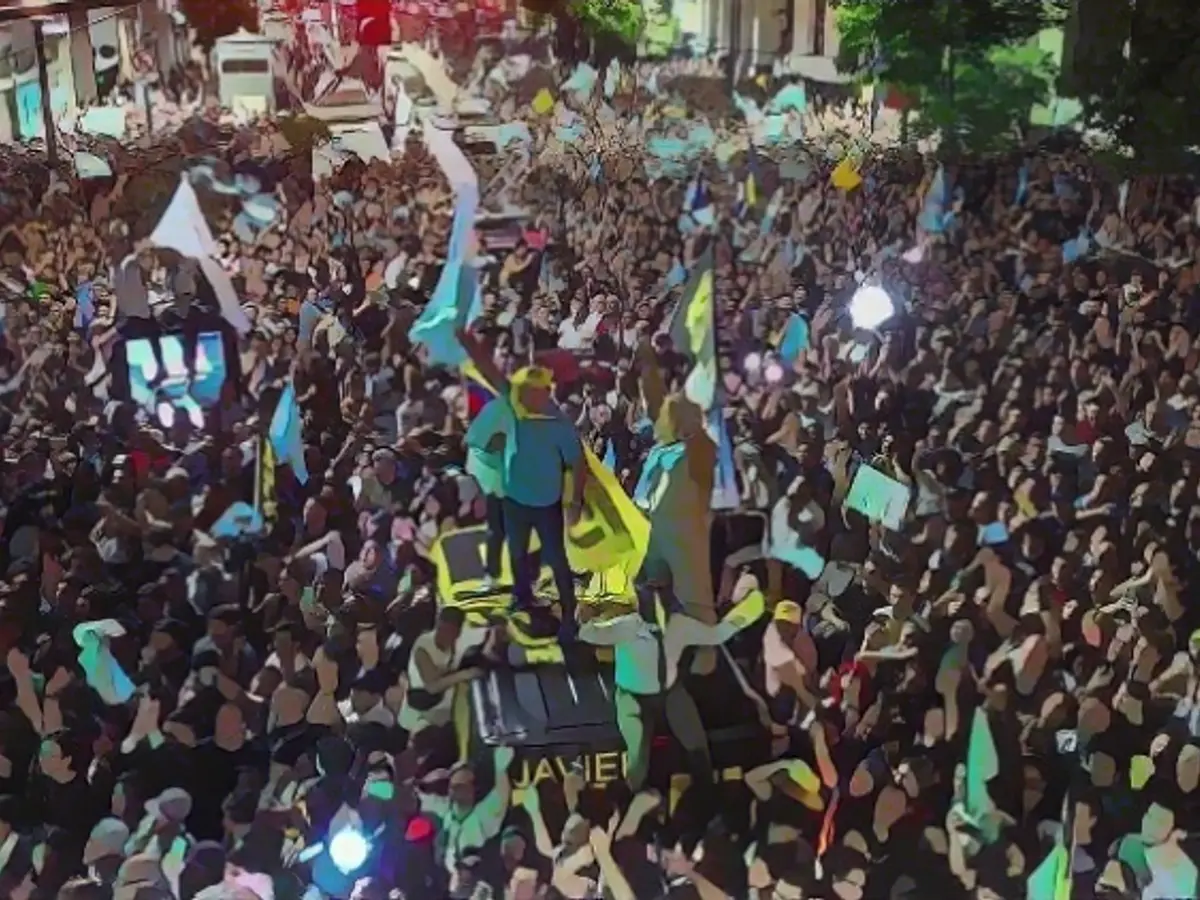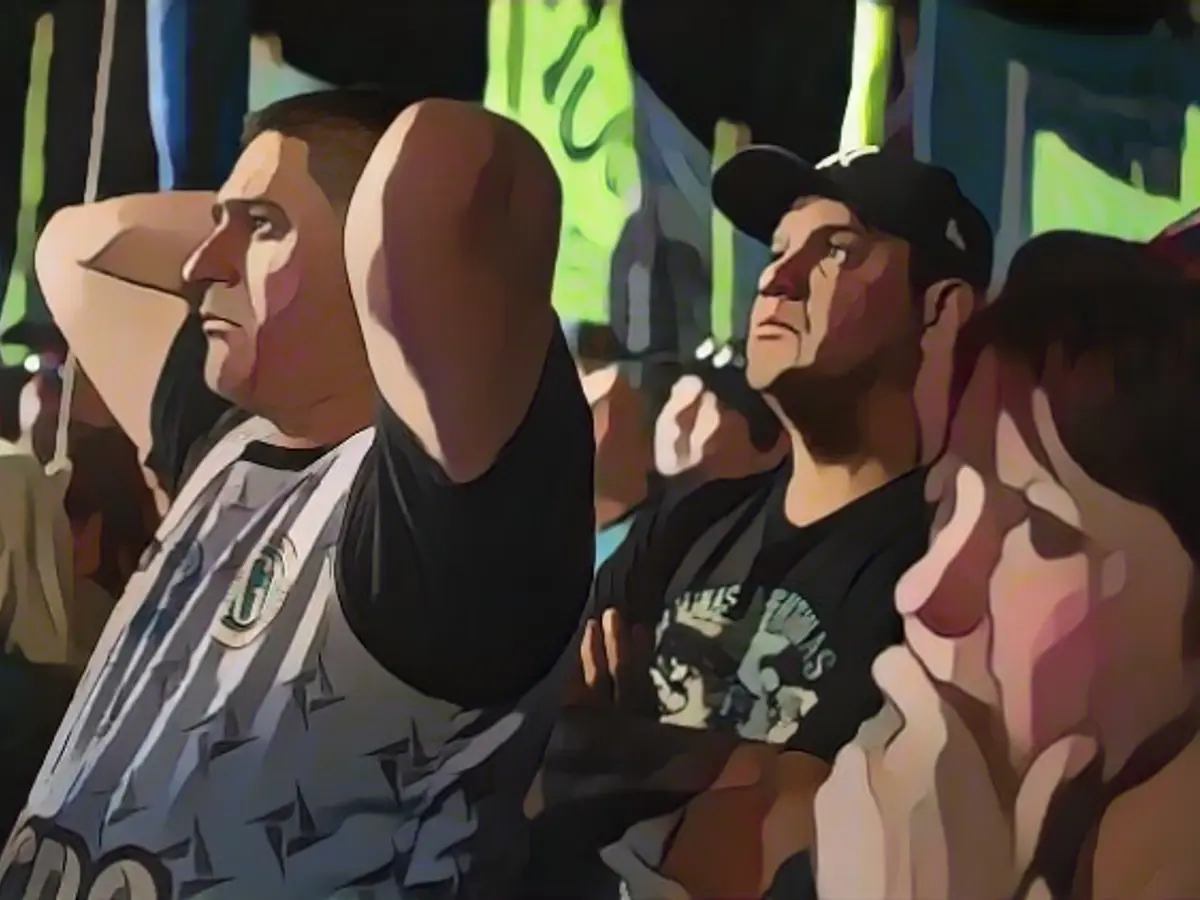Election winner Milei announces radical restructuring of Argentina
In Argentina, the libertarian Milei sweeps the Peronists out of government with a landslide victory. Populists are delighted: Bolsonaro congratulates him, Trump is downright euphoric. The election winner announces a drastic restructuring of the country - and expects resistance.
Less than three weeks. That's how little time the libertarian Javier Milei, who was elected president of Argentina, has to put together his government and decide which steps to take first after the political earthquake. Inflation is running at over 140 percent, and during the election campaign he promised to "end it forever". Poverty in the South American country is now at 40 percent due to the permanent loss of purchasing power.
In his first statements, Milei only thanked the "good Argentinians" for his landslide victory. He warned the others not to "resist" the fundamental changes. The South American country, the continent's second-largest economy, may be facing wild months and years ahead. With a completely open outcome.
Initially, however, the self-proclaimed anarcho-capitalist, who won the run-off election against the governing coalition's candidate in a landslide victory with almost 56%, was able to briefly look forward to the recognition and praise of his international peers. Donald Trump sent congratulations on the "great election" to the south. "MAKE ARGENTINA GREAT AGAIN!", the former US president wrote in the direction of Milei: "The whole world has been watching you. I am very proud of you." Brazil's ex-president Jair Bolsonaro and his son also congratulated him.

In his two short victory speeches, the economist first told colleagues from his party "La Libertad Avanza" ("Freedom Advances") and then told supporters in the center of the capital Buenos Aires: "Today the reconstruction of Argentina begins!" There is no room for gradual change. "The changes the country needs are drastic." He drew comparisons with 19th century Argentina: "We will become a world power again," he announced. This would take 35 years. Never before in Argentinian history has a political current remained in power for anywhere near as long.
Cut back, privatize, dollarize
By far the most important issues in the polls were inflation and high consumer prices, followed by corruption and security. Milei announced his intention to abolish the "excrement" of the national currency, the peso, and the central bank in order to introduce the US dollar as the official means of payment. It is not clear whether this is even feasible. Argentina is heavily indebted, has hardly any foreign currency and has to constantly juggle financially to avoid going bankrupt. Milei therefore wants to close ministries, drastically cut public spending, dismantle the "omnipresent state" and privatize everything that is not nailed down. In view of the drastic changes, he expects resistance on the streets and has announced that he will crack down on this with a firm hand.
The economist is a supporter of an originally Austrian economic doctrine that propagates radically free markets and individualism. For years, the future president has been known in Argentina as an angry opponent of the government, the state and socially oriented movements. In the course of his appearances, he has presented a variety of extreme proposals and beliefs; for example, that the organ trade should be a free market like any other, that he would radically relax gun laws or consistently cut state social programs. He only entered politics three years ago. He had told confidants that God had given him the mandate to do so.

Milei's future vice president is Victoria Villarruel, who has links to right-wing groups around the world and is the daughter of an officer from Argentina's former military dictatorship. Villaruel disputes the official figure of 30,000 dead and disappeared victims of the economic-liberal dictatorship and recently proposed abolishing the central memorial to its victims so that "the entire Argentine population" could "enjoy" the space. In September, the United Nations declared the museum and the site a World Heritage Site.
New head, failed ideas
Milei was the favorite for the presidency before the first round of voting, but surprisingly came second behind the current Minister of Economy, Sergio Massa. He then allied himself with the conservative ex-president Mauricio Macri and his candidate Patricia Bullrich, who was eliminated in third place. In the run-off election against Massa, the votes of the conservative alliance brought him clear success. Macri, who helped cause the current economic crisis with his liberal market measures during his presidency from 2015 to 2019, wrote after Milei's victory that "a spectacular future of growth, work, education and freedom awaits us". Bullrich was security minister under him.
Entrepreneur Elon Musk also commented on Milei's victory on X: "Prosperity is coming to Argentina," he said. Colombia's left-wing President Gustavo Petro sees things very differently. Milei's victory was "sad for Latin America", as neoliberalism no longer had any answers to the current problems. In turn, El Salvador's "Bitcoin dictator" Nayib Bukele mockingly quoted this tweet: "Now say it without crying."
On Monday, a public holiday in Argentina, consultations on the first economic measures and the future cabinet are due to begin. Many of Milei's ideas had already been implemented in the 1990s. Milei's advisors include the deputy economy minister from back then. His former boss, Domingo Cavallo - who was also partly responsible for the total collapse at the time - called Milei the "best economy minister in history".
After hyperinflation, Cavallo pegged the peso to the dollar under President Carlos Menem, thereby getting the devaluation under control for a few years. At the same time, however, the measures destroyed parts of industry, caused unemployment and led to national bankruptcy, the destruction of private assets and street battles with dozens of deaths. Some of the population still remember this. However, the fear of déjà vu was not as great among the electorate as the desire for a change of government. The people will get it. From December 10, the libertarian Milei will be sitting in Argentina's presidential palace.
- President-elect Milei, with support from Brazil's Jair Bolsonaro and former US President Donald Trump, plans to introduce the US dollar as Argentina's official currency, a move that could face resistance due to the country's high public debt and lack of foreign currency reserves.
- In a bid to tackle soaring inflation, Argentinian election winner Milei has announced ambitious plans to privatize public services and dismantle the "omnipresent state," moves that could lead to confrontations on the streets, prompting him to suggest a firm response.
- Elon Musk, the entrepreneur behind SpaceX and Tesla, praised Milei's victory, calling it a sign of prosperity for Argentina, a stance that contrasts with Colombian President Gustavo Petro's view that Milei's neoliberal policies have no answers for Latin America's current economic challenges.
- As Argentineans brace for the implementation of Milei's radical restructuring plans, they may find themselves recalling the 1990s when economic measures pegging the peso to the US dollar led to a series of negative consequences for the South American country, including job losses, asset destruction, and street violence.
Source: www.ntv.de








